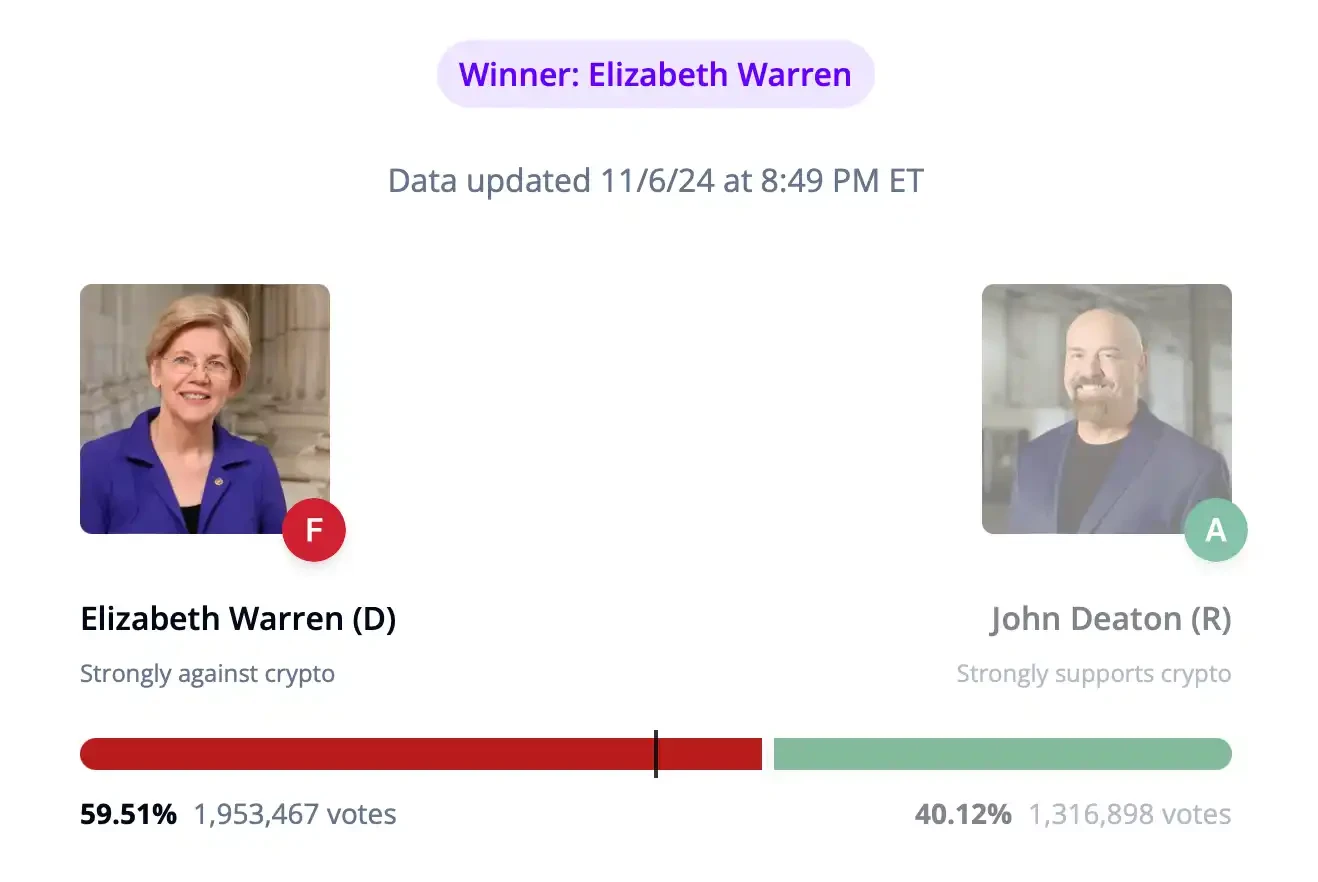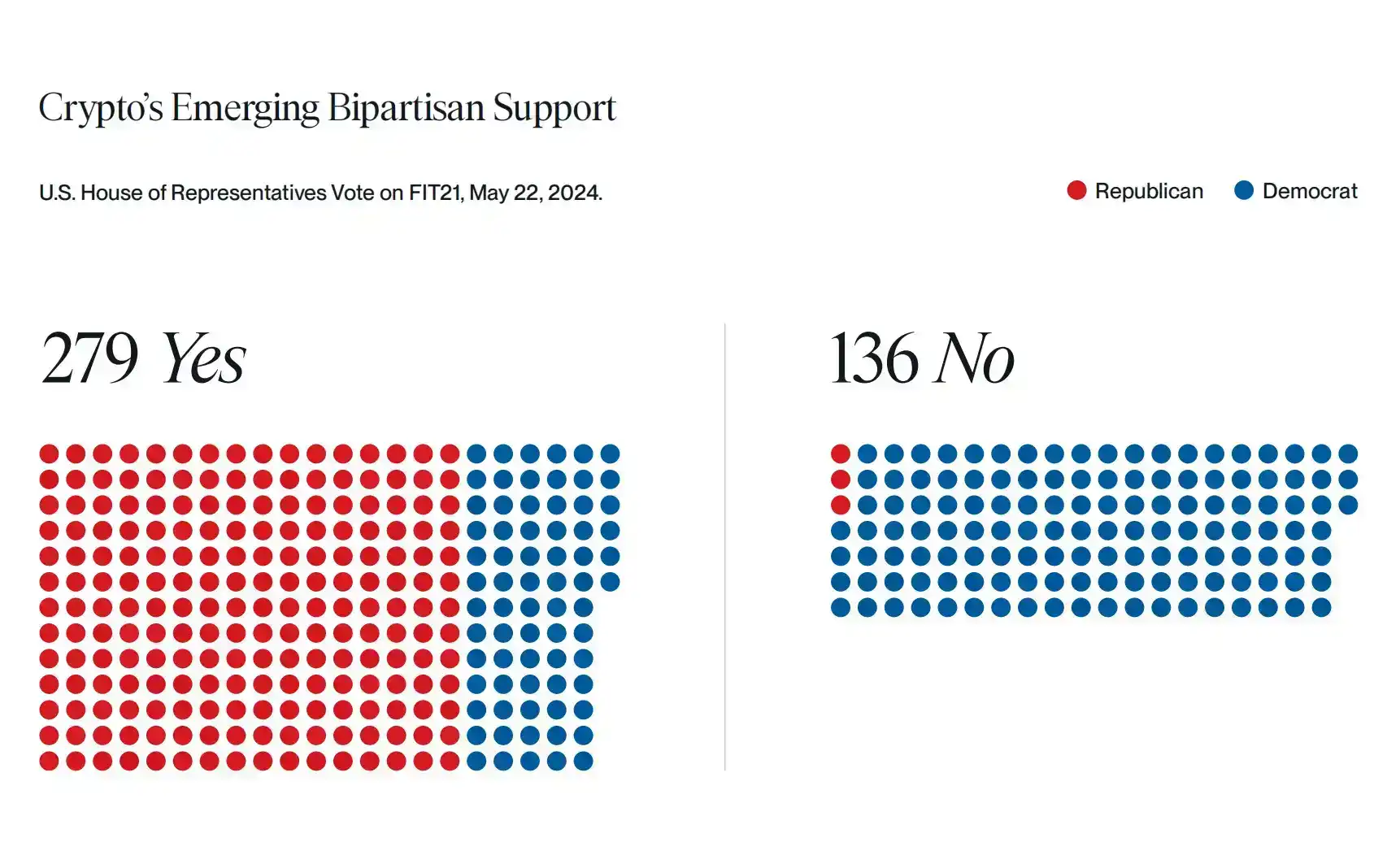Bienvenidos al Congreso más amigable con las criptomonedas en la historia de los EE. UU., con $40 millones en fondos criptográficos
On November 6, according to data from the Stand With Crypto website initiated by Coinbase, a total of 247 candidates who support criptocurrency won seats in the House of Representatives, and only 113 members opposed to cryptocurrency. The Stand With Crypto website also shows that the Senate is also biased towards supporting cryptocurrency, with 15 supporters and 10 opponents.
Coinbase CEO Brian Armstrong praised the results of the congressional election as a watershed moment for cryptocurrency, writing on Twitter: Welcome to the most cryptocurrency-supportive new members of Congress in U.S. history.
The House of Representatives has more members and represents diversity, and usually initiates legislation, while the Senate is smaller and more conservative, and usually deliberates proposals initiated by the House of Representatives. Since both the House of Representatives and the Senate tend to support cryptocurrencies, the path to favorable legislation may be smoother, and crypto industry insiders are optimistic about the potential for supportive regulation in the U.S. Congress in the future.
To make this happen, we cannot do without the real money of those who work in the Crypto industry.
$40 million to support the campaign, crypto lobbying funds become the key tie breaker for the Republicans to win the Senate
On November 6, Ohio auto dealer and blockchain entrepreneur, Republican Bernie Moreno defeated Senate Banking Committee Chairman, strong critic of cryptocurrency, Ohio Democratic Senator Sherrod Brown, giving the Democrats a 51-49 victory over the Republicans in the Senate. Morenos victory can be said to have ensured that the Republicans regained the upper house of Congress, which is also seen as one of the most expensive Senate races this year.
Winning with money
The campaign was supported not only by Trump and his campaign team, but also by several crypto companies, corporate executives and investors, who spent $40 million to help Moreno win the seat. According to Coindesk, Federal Election Commission documents show that this largest single campaign expenditure from the digital asset industry was funded by Fairshake PAC and its affiliated organizations (especially Defend American Jobs), far exceeding the organizations initial $12 million investment in Ohio. These funds are mainly used to support Morenos advertising campaigns, which is the most money any group has invested in this key battlefield so far.
Since Fairshake’s involvement in the election in August, Ohio voters’ attitudes toward Moreno have improved significantly. An industry poll showed that in early August, Moreno’s support rate among likely voters was 39.6%, while Brown’s was 48.3%. According to ongoing polling statistics from the political analysis website FiveThirtyEight.com, Moreno’s support rate has increased by 2.3 percentage points since Fairshake began operations in Ohio.
Until November 6, Bernie Moreno won the majority support in the final election, winning the key battle and winning the majority for the Republican Party. At the same time, Senator Tim Scott (Republican of South Carolina) may become the next chairman. Although Scotts crypto stance has long been low-key, he recently publicly supported digital asset innovation at the Bitcoin 2024 event in Nashville and said at the SALT conference in Wyoming that if he is elected chairman, he may set up a special crypto subcommittee.
Super PACs like Fairshake can only support candidates through so-called independent expenditures — ads and other services that aren’t directly affiliated with or approved by a campaign. In some races, Fairshake has spent millions on negative ads against candidates who don’t support pro-crypto policies, but in this case, the ads were positive and aimed at supporting Moreno.
Sold the company and went all in on blockchain, who is Bernie Moreno?
What is gratifying is that Bernie Moreno, who won this key seat, is not just a pro-crypto politician, but a real Crypto practitioner.
Reagan McCarthy, a spokesman for Moreno Bernie, once told The Washington Post, Unlike Sherrod Brown, who doesnt know the difference between a blockchain and a chainsaw, Bernie has a deep understanding of this technology, knows how to ensure it develops in the United States, and will work to ensure that the United States leads the world.
In 2019, Moreno, a luxury car dealership magnate living in Cleveland, sold seven car dealerships, keeping only two, in order to support his other company, Ownum, a crypto project that provides digital car title products.
Moreno launched a project called Blockland in 2018 to make Cleveland a blockchain technology center. At the same time, he founded the crypto project Ownum. Ownum is engaged in the business of developing technology products that can replace paper-based government processes through digitization.
In April 2019, Moreno was appointed to the Ohio Innovation Authority’s executive committee. At the time of Moreno’s appointment, Ownum announced its first product, a paperless blockchain project for vehicle titles called CHAMPtitles.
Moreno also served as a consultant to the Ohio Department of Motor Vehicles, during which time CHAMPtitles was offered the opportunity to work with the DMV to digitize the vehicle title transfer process, a partnership that provided CHAMPtitles with significant business growth opportunities.
In September 2019, Moreno was nominated to join the board of directors of MetroHealth, the Cleveland public hospital system. In October, Ownum’s second product, Vital Chain, which provides blockchain-based birth and death certificates, successfully reached a cooperation with MetroHealth and became its first customer.
Later, Moreno resigned from the board seat in preparation for his first Senate election, but these past events were also used by Morenos political opponents to attack him as evidence that he was not a political outsider.
The ratio of friends to enemies is close to 1:3. Welcome to the most pro-crypto Congress in American history.
When Trump won 270 votes, the U.S. crypto industry was celebrating a major victory. After the victory, a meme of Gary Gensler, the current chairman of the SEC, quickly spread in the crypto community.
This is because of a promise Trump made to the crypto community during this years election: if he is elected the 47th President of the United States, he will fire the SEC chairman who is hostile to the regulation of the crypto industry.
In order to win this election, Trump frantically showed goodwill to people in the crypto industry during this years campaign and became a Bitcoin activist. At the Bitcoin 2024 conference held in Nashville in July, Trump mentioned that if he could win the election, he would formulate a series of pro-crypto policies to ensure that the United States would become the worlds crypto center and Bitcoin superpower. This includes firing the current SEC Chairman Gray Gensler, appointing a presidential advisory committee on cryptocurrencies, and using Bitcoin as a strategic Bitcoin reserve for the United States.
Lectura relacionada: Trump becomes the first “Bitcoin president” in American history
After Trump won the election, many industry insiders began to be optimistic about the industrys more clear and supportive regulatory policies in the future. Of course, replacing a pro-crypto president and firing an anti-crypto chairman cannot fundamentally reverse the pressure that cryptocurrencies face at the political level in the United States. What really makes institutions and various practitioners optimistic and even excited is that the United States is about to usher in a brand new pro-crypto Congress.
According to Stand With Crypto statistics, in this election, a total of 261 candidates who support cryptocurrency won seats in the House of Representatives, while there were only 116 members who opposed cryptocurrency. At the same time, the new Senate is also more inclined to support cryptocurrency, with 17 supporters and 12 opponents.
After the election results came out, Coinbase CEO Brian Armstrong praised the results of the congressional election as a watershed in the development of cryptocurrency on social media, calling it the most supportive of cryptocurrency Congress in U.S. history.
Of course, not all of Congress is overwhelmingly in favor of cryptocurrencies. In the Senate, despite the fact that the pro-crypto Republican candidate John Deaton received a lot of support from the crypto industry, he still lost to Elizabeth Warren, who has more political resources and a better resume. This long-time enemy of the crypto industry has always advocated for stronger regulation in the past. After successfully being re-elected as a Democratic senator in Massachusetts, she has also become one of the few tough nuts for the crypto industry in the Senate.
In fact, before this election, the Republican Party had already begun to work towards forming a pro-crypto government. Poll data shows that 28% of Republicans currently hold or have purchased cryptocurrencies, and 60% of Republicans prefer Congress to clarify crypto regulations. The FIT21 bill passed by Congress this year was also led and promoted by the Republican Party.
In May this year, the FIT21 bill was passed by the House of Representatives by 279 votes to 136. The bill established a regulatory framework for digital assets and may become one of the most far-reaching bills on Crypto. The full name of FIT21 is the 21st Century Financial Innovation and Technology Act. The key is to regulate the regulatory framework for digital assets and provide guidance for more crypto assets to apply for spot ETFs and compliance in the future.
After successfully controlling both the Senate and the House, the Republican Party will undoubtedly become a powerful party that no previous government has ever been able to match. In any case, the new Congress has paved the way for the passage of a series of crypto-friendly bills.
American politics enters the era of cryptocurrency
It is no coincidence that the Republican Party is leaning towards the pro-crypto camp and Congress is leaning towards the Republican Party. What is certain is that American politics is entering a new cryptocurrency era.
In June, Trump held a fundraiser at the home of David Sachs, a friend of Peter Thiel, in the wealthy district of San Francisco. During the event, Trump portrayed himself as the cryptocurrency president, slammed the Democratic Partys regulatory hostility to the industry, and said he would stop Genslers crackdown on the crypto industry within an hour of taking office. In the end, Trump raised $12 million from the event.
Lectura relacionada: Silicon Valley turns right: Peter Thiel, A16Z, and the political ambitions of cryptocurrency
According to OpenSecret, a political fundraising data tracking platform, crypto-related political action committees have spent more than $133 million on elections this year and have intervened in 51 races, mainly to help candidates who promise not to heavily regulate cryptocurrencies. The three main PACs are Fairshake, Protect Progress, and Defend American Jobs.
Fairshake’s ads almost never mention cryptocurrency, blockchain or the technology industry. Instead, they focus on the candidates — touting Moreno’s family and his views on the energy industry, for example, as sharing Trump’s views.
In February 2024, Fairshake spent $10 million to attack the integrity of Katie Porter, who was running for a vacant California Senate seat, because Porter had voted against bills supporting cryptocurrency. As a result, Porter lost the primary to Congressman Adam Schiff.
The cryptocurrency industry sees this as validation of its strategy of spending money to support friends as well as to destabilize enemies.
Fairshake also contributed to the defeat of New York Rep. Jamaal Bowman and Cori Bush in the primary elections, investing $2 million in Bowman and $1.4 million in Bush. In the Utah Republican primary, Fairshake spent $3.4 million to support John Curtis, defeating Trent Staggs, and the crypto-friendly Curtis won the Utah Senate seat.
Since the beginning of this year, American Crypto companies and investment institutions, led by Coinbase, Ripple, a16z, and Jump Crypto, have finally ushered in a foreseeable optimistic outlook for the industry by spending money.
Just two days before Election Day, a16z partner Chris Dixon posted on social media that he had donated more than $23 million in additional funds to Fairshake and its affiliated political action committee (PAC) for the 2026 midterm election cycle.
Coinbase founder Brian Armstrong wrote that Coinbase and a16z have provided additional financial support to Fairshake, and Fairshake has invested approximately $78 million in the 2026 midterm elections. The Stand With Crypto website he founded currently has 1.9 million supporters, and the goal is to increase the number of supporters to 4 million by the 2026 midterm elections.
Armstrong said Stand With Crypto also plans to expand its influence internationally. “The crypto industry hopes to promote similar rules at the G20 or a wider international level. Only through global adoption can cryptocurrencies revolutionize the global financial system and enhance economic freedom.”
In the first half of 2022, the SEC issued the SAB 121 (Staff Accounting Bulletin No. 121) bill, forcing banks to stay away from crypto custody business. In April of this year, the anti-SAB 121 bill passed the Senate and the House of Representatives with the joint efforts of both parties, but was vetoed by the current President Biden. With the rise of Trump and his pro-crypto government, the beginning of a new era of cryptocurrency compliance seems to have become an increasingly certain event.
This article is sourced from the internet: Welcome to the most crypto-friendly Congress in U.S. history, with $40 million in crypto funding
Original author: Grapefruit, ChainCatcher Original editor: Nian Qing, ChainCatcher On November 5th local time, the voting for the 60th U.S. presidential election came to an end. Who between Donald Trump and Kamala Harris will eventually move into the White House is not only the focus of world attention but also a new change in the crypto world. Since the beginning of his campaign, Trump has publicly expressed his support for the development of cryptocurrencies many times. If he successfully returns to the White House, the United States strict regulatory policy on the crypto market may usher in a change, injecting new vitality into the development of the industry. At the Bitcoin 2024 Conference, Trump said in his speech: If re-elected, he will ensure that the government retains 100% of the…













Want to share my experience regarding a Bitcoin investment scam involving Coinyee, where I lost over $375,000. Fortunately, I was able to recover my funds with the help of [. FEDERALASSETRECOVERYæ⃝AOL•ᑕ0ᗰ ] They are truly one of the rare services that can help in such situations. If anyone is facing a similar issue, I highly recommend reaching out to them for assistance.
“If you’ve lost money fraudulently to any company, broker, or account manager and want to retrieve it, contact www.Bsbforensic.com They helped me recover my funds!”